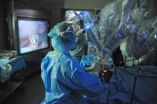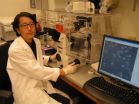(Press-News.org)
VIDEO:
Tamer A. Ghanem, M.D., Ph.D., director of Head and Neck Oncology and Reconstructive Surgery Division in the Department of Otolaryngology -- Head & Neck Surgery at Henry Ford Hospital, discusses...
Click here for more information.
DETROIT – An incisionless robotic surgical procedure is offering patients a new option to remove certain head and neck cancer tumors without visible scarring, while preserving speech and the ability to eat.
Henry Ford Hospital in Detroit is among the first in the country to perform TransOral Robotic Surgery (TORS) using the da Vinci® Surgical System. Unlike traditional surgical approaches to head and neck cancer, TORS patients are able to return to their normal lives only a few days after surgery without significant pain and disfigurement.
"TORS offers shorter post-operative recovery than standard open surgical approaches, giving patients the opportunity to quickly and successfully return to their normal lives," says Tamer A. Ghanem, M.D., Ph.D., director of Head and Neck Oncology and Reconstructive Surgery Division in the Department of Otolaryngology–Head & Neck Surgery at Henry Ford Hospital.
"TORS allows surgeons to completely remove tumors of the head and neck while preserving speech, swallowing, and other key quality of life issues such as eating. There also is no visible scaring or disfigurement."
Led by Dr. Ghanem, Henry Ford Hospital has performed more than a dozen TORS procedures since it was approved in January by the U.S. Food and Drug Administration to remove malignant and benign tumors of the mouth, tongue, tonsils, and parts of the throat.
Prior to TORS, patients would traditionally begin treatment with radiation therapy, or a combination of chemotherapy and radiation therapy, depending on the stage of their cancer. Side effects of radiation – dry mouth, loss of taste and difficulty swallowing – can potentially be avoided with TORS
Traditional surgery has side effects as well. It requires a long incision be made across the lip and jaw to access the tumor. This approach can results in significant swelling, longer post-operative recovery, damage to surrounding structures, and speech and swallowing problems.
With TORS, surgeons can access tumors through the mouth using the slender operating arms of the da Vinci, thus not requiring an open skin incision.
"Surgeons operate with greater precision and control using the TORS approach," says Dr. Ghanem, "minimizing the pain, and reducing the risk of possible nerve and tissue damage associated with large incisions."
Some of TORS's other benefits include:
Significantly less blood loss
No visible scarring
Possibility of avoiding a tracheotomy
Minimization or elimination of need for chemoradiation therapy
Fewer complications and shorter hospital stay
Faster recovery, return to normal speech and swallowing
Equivalent cancer control to radiation therapy
Patients with early stage tonsil and base of tongue cancers may not need to receive radiation therapy following TORS, depending on the final tumor margins and pathological characteristics of the tumor.
In addition to TORS, Dr. Ghanem specializes in complex head and neck oncology cases, offering both cancer resection as well as reconstructive surgery using microvascular techniques (taking tissue from one part of the body and transplanting it to the head and neck areas to improve function and esthetics). In addition, he performs thyroid, parathyroid, and salivary gland surgery, reconstruction after Mohs procedures and robotic-assisted thyroidectomy, in which the incision is made in the arm pit instead of the neck to conceal it.
INFORMATION:
The Department of Otolaryngology-Head & Neck Surgery also specializes in robotic-assisted thyroidectomy and complex cancer resections with advanced reconstructive techniques. To learn more, visit http://www.henryford.com/body.cfm?id=38951
About Henry Ford Hospital
Henry Ford Hospital, the flagship facility for Henry Ford Health System, is an 805-bed tertiary care hospital, education and research complex. The hospital is staffed by the Henry Ford Medical Group, one of the nation's largest and oldest group practices with 1,200 physicians in more 40 specialties. The hospital, which opened in 1915, is a Level 1 trauma center, recognized for clinical excellence and innovations in the fields of cardiology, cardiovascular surgery, neurology, neurosurgery, orthopaedics, sports medicine, organ transplants, and treatment for prostate, breast and lung cancers. The hospital annually trains more than 500 residents and 125 fellows in 46 accredited programs. More than 400 medical students train at the hospital each academic year. In 2009, Henry Ford Hospital received more than $70 million in research funding. The hospital and campus is led by CEO John Popovich Jr., M.D. To learn more, visit HenryFord.com.
RIVERSIDE, Calif. – Human pluripotent stem (hPS) cells can generate any given cell type in the adult human body, which is why they are of interest to stem cell scientists working on finding therapies for spinal cord injuries, Parkinson's disease, burns, heart disease, diabetes, arthritis, and other ailments.
Before hPS cell technologies can be translated into clinical applications, however, some obstacles must first be overcome.
One such obstacle frustrating stem cell researchers is "cell death" that the major types of hPS cells, including human embryonic stem cells ...
Plants cannot thrive without nutrients such as nitrogen, phosphorous or potassium, therefore farmers usually use organic and industrially manufactured mineral fertilizers to supply wheat, maize and others with these vital substances. In future, the need for nutrients will be soaring because we will only be able to supply the world's growing population with food and cover surging demands for biofuels by using fertilizers. Logically, that causes the prices for these nutrients to skyrocket. But that is not the only problem. The deposits of rock phosphates required for manufacturing ...
A child who can't stop scratching himself may well be suffering from atopic dermatitis, also known as neurodermatitis. Extreme irritability of the skin with a concomitant urge to scratch is typical of the disorder. The condition often appears during the first year of life and is on the increase in industrialized countries. The patient's skin becomes hypersensitive and reacts strongly to even mild irritation. A research team led by Dr. Astrid Peters and Professor Katja Radon from Ludwig-Maximilians-Universitaet (LMU) in Munich has just published a longitudinal study which ...
St. Louis, MO – Current research provides a novel model for rheumatoid arthritis research. The related report by LaBranche et al, "Characterization of the KRN cell transfer model of rheumatoid arthritis (KRN-CTM), a chronic yet synchronized version of the K/BxN mouse," appears in the September 2010 issue of The American Journal of Pathology.
Nearly 1% of the population is affected by rheumatoid arthritis, and women are affected three to five times more often then men. Although the course of disease varies greatly, daily living activities are impaired in most affected ...
COLUMBIA, Mo. – With the fragmentation and globalization of the U.S. textile and apparel industry, business activities and roles have changed, impacting their organizational identity. The evolving organizational identity of these firms has created many questions as to how it affects the businesses financially. Now, a researcher at MU has explored how U.S. textile and apparel firms describe themselves as organizations and how those descriptions compare to U.S. Census Bureau industry classifications.Jung Ha-Brookshire, an assistant professor in the Textile and Apparel Management ...
1. A Low-carb Diet Based on Animal Protein May Increase Death Risk
Evidence shows that a low-carbohydrate diet produces weight loss and improves some cardiovascular risk factors. However, health effects of a low-carbohydrate diet may depend on the type of protein and fat consumed. Researchers followed 85,168 women and 44,548 men on a low-carbohydrate diet for 26 and 20 years respectively. The patients ate either an animal-based (emphasizing animal sources of fat and protein) low-carbohydrate diet, or a vegetable-based low-carbohydrate diet. The researchers found that ...
ST. PAUL, Minn. –A new study shows that mild cognitive impairment (MCI) may affect more men than women. The research is published in the September 7, 2010, print issue of Neurology®, the medical journal of the American Academy of Neurology.
Mild cognitive impairment is a condition in which people have problems with memory or thinking beyond that explained by the normal rate of aging. The study found that MCI was 1.5 times higher in men compared to women. MCI often leads to Alzheimer's disease.
"This is the first study conducted among community-dwelling persons to find ...
ROCHESTER, Minn. -- A new Mayo Clinic study found that the prevalence of mild cognitive impairment was 1.5 times higher in men than in women. The research, part of the Mayo Clinic Study of Aging, also showed a prevalence rate of 16 percent in the population-based study of individuals aged 70-89 without dementia who live in Olmsted County, Minn. The study will be published in the September issue of Neurology.
"The finding that the frequency of mild cognitive impairment is greater in men was unexpected, since the frequency of Alzheimer's disease is actually greater in women. ...
A surface molecule on bacteria that instructs bone cells to die could be the target for new treatments for bone disease, says a scientist speaking at the Society for General Microbiology's autumn meeting today.
Blocking the death signal from bacteria could be a way of treating painful bone infections that are resistant to antibiotics, such as those caused by Meticillin-resistant Staphylococcus aureus (MRSA).
Bone disease, or osteomyelitis, affects 1 in 5,000 people around the world. It can occur at any stage in life and attack any bone in the body, where it leads to ...
Cockroaches could be more of a health benefit than a health hazard according to scientists from the University of Nottingham, who have discovered powerful antibiotic properties in the brains of cockroaches and locusts.
Simon Lee, a postgraduate researcher who is presenting his work at the Society for General Microbiology's autumn meeting in Nottingham, describes how the group identified up to nine different molecules in the insect tissues that were toxic to bacteria. These substances could lead to novel treatments for multi-drug resistant bacterial infections.
The group ...

